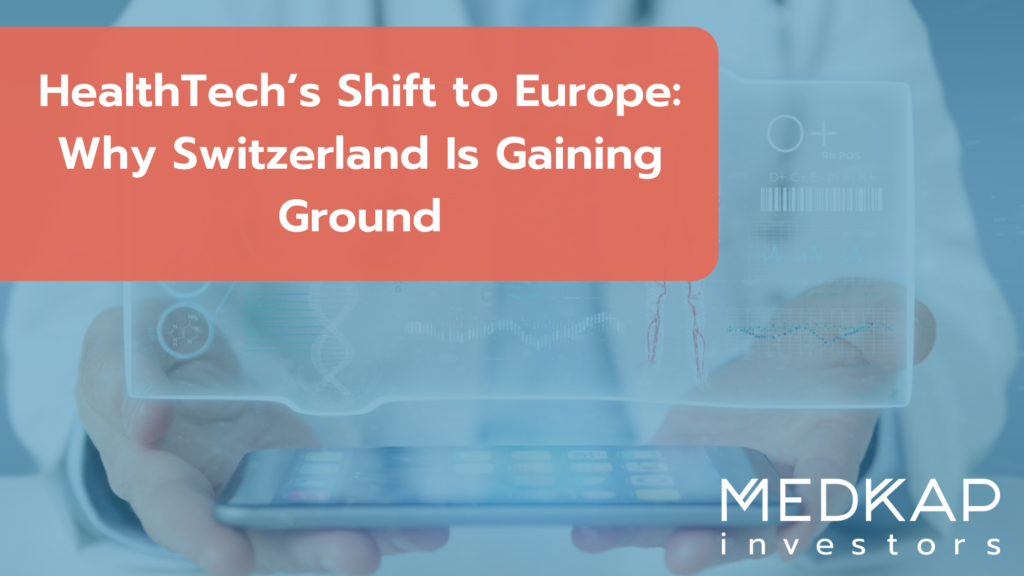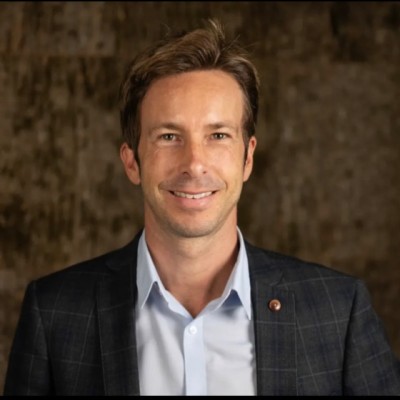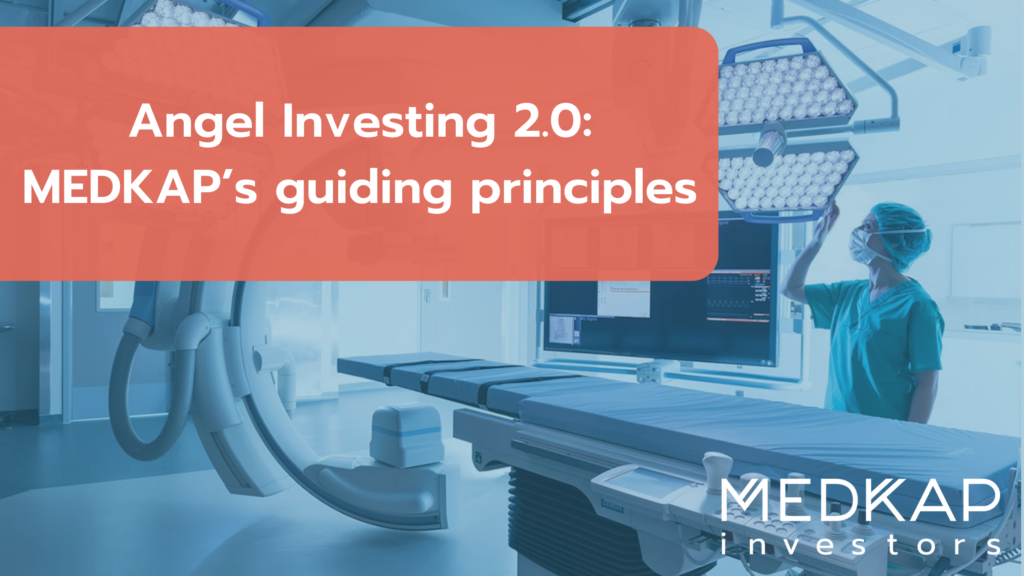HealthTech’s Shift to Europe: Why Switzerland Is Gaining Ground
While US-based founders and investors face growing uncertainty, Europe – and especially Switzerland – is quietly gaining ground as a preferred base for talent and capital. In this two-part view, Jan Fülscher highlights why Switzerland is becoming a first choice for founders and angels, while Laurent Degoumois explains how VC and PE activity is adapting, and what’s needed to build the next generation of global players.
Why HealthTech capital is tilting toward Europe - and why Switzerland looks like a smart first stop
by Jan Fülscher
The United States, formerly in the forefront of innovation and entrepreneurship, is sending mixed messages to science-based founders. Washington has imposed a flat 15 % overhead cap on all NIH grants and new export controls on advanced biotech tools. Many researchers now question whether the U.S. is still the best launch pad. In a recent Nature poll, three-quarters of U.S. scientists said they are actively considering a move abroad.
Europe is ready to receive them. The European Research Council just raised relocation top-ups to as much as €3.5 million per grant – money that follows the scientist and often seeds new spin-outs.
Switzerland adds its own draw: a dense life-science cluster around Basel, Zürich and Lausanne and a talent pipeline from ETH Zürich and EPFL.
Switzerland is a welcoming place: Innosuisse co-funds market-entry projects for science-based start-ups, reducing the load in the riskiest phase. The latest Swiss Biotech Report shows the sector raising record rounds even in a cooling global cycle—evidence that local angels and corporates still deploy cash.
Intellectual-property strategy is becoming a sharper edge. China is filing more patents than ever and continues to increase its IP output. Europe’s response is the Unitary Patent, live since 1 June 2023, which lets a start-up protect inventions across (so far) 18 EU states with one filing – far cheaper than the patchwork used before.
While Switzerland sits outside the regime, its firms can still claim European coverage through the EPO and keep high-value R&D at home.
Implications for angels in Switzerland and Europe:
- Deal flow: Returning U.S. and Asian talent boosts the quality of local founding teams. Angels gain access to know-how that once priced itself exclusively in Boston or the Bay Area.
- Regulatory hedge: Founders can clear Swissmedic first, tap EU market access next, and defer FDA exposure until the political climate steadies. This sequence lowers risk without slowing global ambition.
- IP playbook: Early filings in both Switzerland and the Unitary Patent system secure freedom to operate before Chinese incumbents crowd the field. Angels should budget for dual filings from day one.
Change creates uncertainty, but from a Swiss vantage it also opens a window: robust talent inflows, supportive public money and a clear path to pan-European IP protection. For early backers willing to write the first ticket, few regions now offer a better risk-reward balance.
VC and PE: Switzerland’s Window of Opportunity in HealthTech
by Laurent Degoumois
Globally, the private equity (“PE”) and venture capital (“VC”) environment remains challenging, with limited exit opportunities and persistent policy uncertainty weighing on transaction activity. In healthcare and life sciences, while the US has historically been the primary focus, rising concerns about regulatory unpredictability, FDA approval timelines, and public reimbursement dynamics are driving greater investor caution.
Despite these broader market headwinds, healthcare M&A and PE activity has remained relatively resilient in recent months. In Q1 2025, healthcare private equity deal activity reached USD 25 billion, continuing the strong momentum from 2024, which marked the second-highest annual deal value on record. Large transactions, such as KKR’s 50% stake in Cotiviti and TowerBrook/CD&R’s acquisition of R1 RCM, also reflect sustained interest in tech-enabled care models and data-driven healthcare delivery. In Europe, successful listings earlier this year, such as Asker Healthcare in Sweden and Diagnostyka in Poland, demonstrate continued investor appetite for high-quality healthcare companies.
Switzerland, with its innovation-friendly ecosystem and regulatory clarity, is increasingly seen as a hub for healthcare investing. As noted earlier, there is currently a window of opportunity to attract top scientific talent and international investor attention amid ongoing macro and policy uncertainty in the US. In fact, Swiss PE and VC healthcare investments have outperformed US deals and much of the rest of Europe over the past decade.
Still, the core challenge in Europe remains successful scale-ups. No European company is among the world’s ten most valuable, and only 18 are in the top 100 – down from 41 at the start of the 21st century (as recently highlighted in an FT opinion article, source: EY). While Switzerland is home to global players like Novartis and Roche, both have slipped further down the rankings. This calls for action: Switzerland can take the lead on a scale-up agenda in life sciences and healthtech companies. Beyond strong IP protection and a deep talent pool, what’s needed is reduced bureaucracy, continued public support for “ease of doing business”, and stronger dialogue between industry and start-ups.
A vibrant and well-capitalized VC and PE ecosystem can act as a key enabler. Encouragingly, there are tentative signs of momentum: in addition to life sciences, tech-enabled healthcare services are gaining traction, with some fund managers beginning to focus investment strategies on this emerging segment. As one General Partner noted, “digital health has become a strategic imperative, offering cash-efficient growth and attracting sustained buyer interest.”
And who knows, maybe the next European unicorn is a Swiss health-tech provider, backed by a specialist PE fund!
Closing Remark
Switzerland offers many of the right ingredients: talent, funding, IP strength and regulatory clarity. Yet capitalizing on this moment will take more than favorable trends. Angels, VCs, corporates and public actors must work together to turn scientific and entrepreneurial promise into companies that scale – and stay. The window is open.
If you want to stay updated on Angel Investing in HealthTech at MEDKAP, please
- subscribe to our newsletter
- subscribe to our LinkedIn page.
About the authors
Jan Fülscher: Jan is a seasoned entrepreneur and startup expert with over 20 years of experience in building and managing innovation ecosystems. As a mentor, coach, and educator, he empowers founders and fast-growing companies to achieve business success. Jan is passionate about fostering entrepreneurship and supporting the next generation of innovators in Switzerland and beyond.
Laurent Degoumois: Laurent is an experienced investment professional with a strong background in private equity, venture capital, and healthcare investing more broadly. He has held leadership roles in the financial sector, advising and supporting innovative private equity funds and companies across Europe and the US. Laurent is passionate about fostering entrepreneurship and driving impactful growth in the HealthTech ecosystem.




